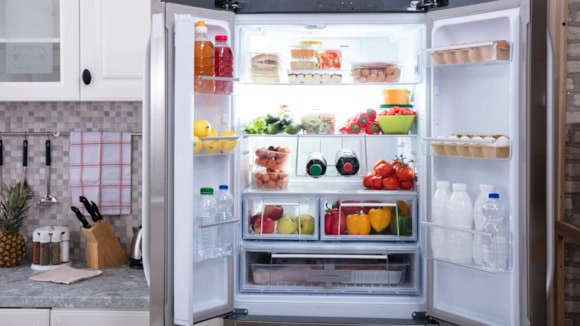
With the annual rate of food and drink price inflation in the UK reaching 4.5% in June 2025, it’s no surprise that many Brits are trying to keep their food fresh for longer to avoid trips to the shop to buy replacements.
To help Brits keep their food fresh for longer and store it in the safest possible way, Sarah King, a food hygiene expert, has shared her advice on how to keep some particularly tricky types of food stored safely.
Many fresh foods can be tricky to keep fresh and safe to eat for long periods of time, and people are understandably concerned about eating food that is past its best in case it causes harm.
Bananas
“Bananas are a household staple in most UK homes, but they can be tricky to store properly and often the timeframe between them being under-ripe to over-ripe is short-lived. So, how should you store them to keep them fresher for longer?
“The first step to keep bananas fresh for longer is to buy them when they’re still green, helping to give you the longest window when they’re at their best. You should remove them from their plastic packaging, which traps the moisture released by the fruit as they ripen, making them ripen even faster. You should also separate them from other fruit, as being in close proximity to other ripening fruits will speed up the process for both. Instead, keep them in an open bowl on the countertop, away from other fruits.
“You should avoid refrigerating bananas whilst they’re ripening, as this can prolong the process, but you can store them in the fridge when they’re ripe. They should be good to eat for a week or more. You can also freeze bananas, but this is best when making smoothies or baking, as frozen bananas won’t make the nicest snack.”
Avocados
“Avocados are a popular, healthy breakfast treat, but they can be difficult to keep ripe. When purchasing the fruit, make sure you’re buying them at the right stage of ripening. An unripe avocado will feel firm to the touch and will last for roughly a week, whilst a ripe fruit will feel slightly soft and will last for roughly three days.
“Similar to bananas, you should avoid storing avocados near other fruits to slow down the ripening process. They can also be stored in the fridge, but only once they’re ripe, where they will last for three days to a week. Avocados are also safe to be frozen, where they can be stored for up to six months. “
Bread
“It’s the age-old question, should you bin or keep bread with spots of mould? Mouldy bread is generally best thrown away, as the mould will likely have spread much further through the loaf than is actually visible. Buying sliced bread is a good, cheaper option for keeping your bread fresh for longer, as mould takes longer to spread throughout the loaf.
“To keep your bread fresh for longer, it’s best to keep it covered, either in a bread bin or bread bag, and try to keep the packaging intact and covering as much of the bread as possible. You should also keep the loaf away from water, which can speed up the development of mould.
“If you tend to go through your bread slowly, a good option is to freeze it. This keeps the loaf edible and prevents the spread of mould. To thaw the bread, simply use the defrost setting on your toaster to avoid a soggy slice.”
Cheese
“Storing cheese can be tricky, and the best method often depends on the particular type of cheese. Hard cheeses can be wrapped in clingfilm to be kept fresh for longer, whilst doing the same to soft cheeses will cause them to ‘sweat’. Instead, keep your soft cheese wrapped in baking paper or a waxed cheese cloth to allow them to ‘breathe’, and then place them in an airtight container.
“A consistent temperature is important to keep cheese fresh, so it's important to place your cheese in the back of the fridge. This will prevent bacterial growth.
“Soft cheeses should be consumed quickly after opening, as their high moisture content means mould spreads quickly. Whilst some cheeses, like Stilton, intentionally include mould to add to the flavour, others, like Cheddar, do not benefit from mould, which can in some cases cause illness if consumed. Keep your cheese in an airtight container, and unless it’s a particular type of cheese, dispose of it when you see large amounts of mould.”
Potatoes
“Potatoes benefit from being stored in a cool, dark place, which will slow down the sprouting process. Avoid storing them in the fridge, as the cold will turn the starch into sugar and will taint the flavour.
“You should remove them from their plastic bags and refrain from washing them until you’re ready to use them. Keep them separate from other veg, and keep them out of sunlight, which will reduce sprouting. Finally, you can cut off smaller green shoots, and potatoes in the early stages of sprouting are perfectly safe to eat.”
Onions
“Onions are a staple of many food dishes and are always useful to have in the house. For this reason, it’s beneficial to keep them for as long as possible to avoid unnecessary extra purchases.
“Onions are best stored in a dry, dark place and should not be kept in the fridge. Remove them from their plastic bag to allow the air to circulate around them, and keep them separate from potatoes, as the two together may impact the lifespan of both items.
“You can also safely store chopped onions. Once chopped, add the onion to a freezer bag. If you’re using them soon, store them in the fridge, and they can also be frozen for longer periods of time.”

 Giving Lottery Result for Saturday 15th November 2025
Giving Lottery Result for Saturday 15th November 2025
 New train timetables go live from Sunday 14th December
New train timetables go live from Sunday 14th December
 County Councillors vote for uniting Derbyshire in local government reorganisation
County Councillors vote for uniting Derbyshire in local government reorganisation
 Business must be front and centre in Budget says Chamber as economic growth slows
Business must be front and centre in Budget says Chamber as economic growth slows




